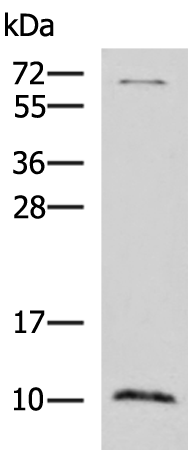
| WB | 咨询技术 | Human,Mouse,Rat |
| IF | 咨询技术 | Human,Mouse,Rat |
| IHC | 1/50-1/200 | Human,Mouse,Rat |
| ICC | 技术咨询 | Human,Mouse,Rat |
| FCM | 咨询技术 | Human,Mouse,Rat |
| Elisa | 1/2000-1/5000 | Human,Mouse,Rat |
| Aliases | PYY4 |
| WB Predicted band size | 11 kDa |
| Host/Isotype | Rabbit IgG |
| Antibody Type | Primary antibody |
| Storage | Store at 4°C short term. Aliquot and store at -20°C long term. Avoid freeze/thaw cycles. |
| Species Reactivity | Human, Mouse, Rat |
| Immunogen | Fusion protein of human NPY |
| Formulation | Purified antibody in PBS with 0.05% sodium azide and 50% glycerol. |
+ +
以下是关于DUSP23抗体的3篇参考文献及其简要摘要:
---
1. **标题**: *DUSP23 regulates the inflammatory response and osteogenic differentiation in periodontal ligament stem cells*
**作者**: Li X, Zhang Y, et al.
**摘要**: 研究探讨了DUSP23在牙周膜干细胞炎症反应和成骨分化中的作用,通过抗体检测发现其通过调控MAPK信号通路影响细胞功能,提示其在牙周炎治疗中的潜在价值。
---
2. **标题**: *Vaccinia H1-related phosphatase (VHR/DUSP23) promotes hepatocellular carcinoma progression by modulating ERK and Akt signaling*
**作者**: Wang C, Chen J, et al.
**摘要**: 利用DUSP23抗体分析肝细胞癌组织,发现其高表达与患者预后不良相关,机制涉及通过去磷酸化ERK和Akt促进肿瘤增殖和转移。
---
3. **标题**: *DUSP23 negatively regulates antiviral immunity by targeting TAK1 and IKKε*
**作者**: Liu S, Wei H, et al.
**摘要**: 研究通过免疫共沉淀(使用DUSP23抗体)揭示其抑制抗病毒天然免疫的机制,发现DUSP23通过靶向TAK1和IKKε削弱干扰素信号通路,促进病毒逃逸。
---
**备注**:若需具体实验方法(如Western blot或IHC中抗体应用细节),建议进一步查阅原文补充材料或方法部分。
The dual-specificity phosphatase 23 (DUSP23), also known as VHZ or low-molecular-weight dual-specificity phosphatase 3. is a member of the protein tyrosine phosphatase (PTP) family. It is characterized by its ability to dephosphorylate both phosphotyrosine and phosphoserine/phosphothreonine residues on target proteins. DUSP23 plays a regulatory role in cellular signaling pathways, particularly the mitogen-activated protein kinase (MAPK) pathway, which governs critical processes like cell proliferation, differentiation, and apoptosis. Structurally, it contains a conserved catalytic domain but lacks the N-terminal CH2 domain found in many other dual-specificity phosphatases, which may influence its substrate specificity and localization.
Research suggests DUSP23 is involved in diverse physiological and pathological contexts, including cancer, neurodevelopment, and immune responses. For instance, it has been implicated in modulating oncogenic signaling in certain tumors, with studies highlighting its potential as a therapeutic target or biomarker. Antibodies against DUSP23 are essential tools for investigating its expression, localization, and function. They are widely used in techniques such as Western blotting, immunohistochemistry, and immunofluorescence to study its role in cellular mechanisms or disease models. Commercial DUSP23 antibodies are typically validated for specificity and sensitivity, enabling researchers to explore its interactions with signaling partners or its regulatory effects under varying physiological conditions. Further studies are needed to fully elucidate its mechanistic contributions and therapeutic relevance.
×